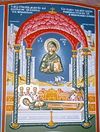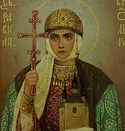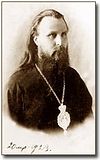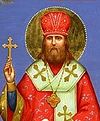

| Previous day | Next day |
| Old Style
July 11
|
Wednesday |
New Style
July 24
|
|
5th Week after Pentecost.
Tone 3.
Fast Day. |
Wine and oil allowed.
|
![]() Commemoration of the Miracle of Great-martyr Euphemia the All-praised, of Chalcedon (451).
Commemoration of the Miracle of Great-martyr Euphemia the All-praised, of Chalcedon (451). ![]() Blessed Equal-to-the-Apostles Olga, princess of Russia, named Helen in holy baptism (969).
Blessed Equal-to-the-Apostles Olga, princess of Russia, named Helen in holy baptism (969). ![]() Uncovering of the relics of Hieromartyr Hilarion, archbishop of Verey (1998).
Uncovering of the relics of Hieromartyr Hilarion, archbishop of Verey (1998).
Hieromartyr Cindeus, priest, of Pamphylia (283-305). St. Arcadius, monk, of Vyazma (ca. 1592).
Martyrs Januarius and Pelagia, of Nicopolis in Armenia (ca. 310). St. Drostan of Old Deer and Aberdeen (Scotland) (6th c.). St. Nicodemus of Hilandar and Vatopedi, Mt. Athos, instructor of St. Gregory Palamas (1320). New Martyr Nicodemus of Elbasan and Mt. Athos (1722). New Monk-martyr Nectarius of St. Anne’s Skete, Mt. Athos, at Vryoulla, Ephesus (1820). St. Cyril, monk, of Paros (1833). New Hieromartyrs Momcilo Grgurevic, Dobroslav Blazenovic, Milan Bozic, Mihailo Djusic, Jovan Zecevic, Bozidar Jovic, Bogdan Lalic, Trifun Maksimovic, Velimir Mijatovic, Bozidar Minic, Miladin Minic, Marko Popovic, Dimitrije Rajanovic, Budimir Sokolovic, Relja Spahic, Lazar Culibrk, Savo Siljac, Savo Skaljka, Milorad Vukojicic, Ratomir Jankovic, Mihailo Jevdjevic, Dusan Prijovic, Dobrosav Sokovic, Nestor Trkulja, Serafim Dzaric, Andrija Siljak, Slobodan Siljak, and Jovan Rapajic, priests, of Serbia (1941-1945). St. Leo, monk, of Mandra.
Repose of cave-dweller Anastasia of St. Cornelius of Padan Hermitage in Olonets (1901).
Thoughts for Each Day of the Year
According to the Daily Church Readings from the Word of God
By St. Theophan the Recluse

Wednesday. [Rom. 15:7-16; Matt. 12:38-45]
In every person who lives unrepentant in sin there lives a demon, as if in a house, who takes charge over everything within him. When by the grace of God such a sinner comes to contrition over his sins, repents and ceases to sin—the demon is cast out from him. At first the demon does not disturb the one who has repented, because there is much fervour within him in the beginning, which burns demons like a fire, and repulses them like an arrow. But then, when fervour begins to grow cold, the demon approaches from afar with its suggestions, throws in memories about former pleasures and calls him to them. If the penitent does not beware, he will soon pass from a sympathy to a desire for sin; if he does not come to his senses and return himself to the state of his former soberness, then a fall is not far off. From desire are born the inclination for sin and decision to commit it—the inner sin is ready; the outer sin is only waiting for a convenient occasion. When an occasion presents itself, the sin will be accomplished. Then the demon will enter again, and begin to drive a person from sin to sin even faster than before. The Lord portrayed this with the parable about the second return of the demon into the clean, swept house.
Articles
 Holy Equal-to-the Apostles Olga |
 “Thou didst cast the proud devil out of Russia”Archpriest Alexander ShargunovSalvation comes to pass where there is a meeting of human striving for truth with the mercy of divine love. |
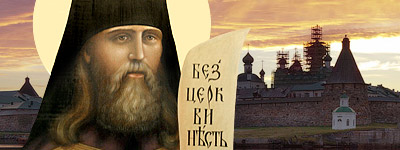 St. Hilarion (Troitsky) |
 Venerable Arcadius of NovotorskSaint Arcadius of Vyazma and Novotorsk was from the city of Vyazma of pious parents, who from childhood taught him prayer and obedience. |



